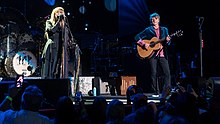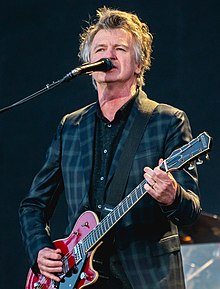|
Neil Finn
Neil Mullane Finn OBE (born 27 May 1958) is a New Zealand singer-songwriter and musician. He is best known for being a principal member of Split Enz, of which he shared lead duties with his brother Tim, and the lead singer, guitarist, and a founding member of Crowded House. He was also a member of Fleetwood Mac from 2018 until 2022. Ed O'Brien of Radiohead has hailed Finn as popular music's "most prolific writer of great songs".[2] Finn joined Split Enz in 1977 after the departure of founding member Phil Judd and facilitated the band's shift away from art rock towards new wave pop. Gradually rising in creative prominence within the band, he wrote the majority of the band's hits in the 1980s, including "I Got You", "One Step Ahead", "History Never Repeats", and "Message to My Girl". After Split Enz broke up in 1984, Finn helped form Crowded House with Split Enz's final drummer Paul Hester and served as the band's lead singer and principal songwriter. Crowded House achieved international success in 1987 when they released the single "Don't Dream It's Over", written by Finn. After Crowded House disbanded in 1996, Finn and his brother released two albums as the Finn Brothers, before reforming Crowded House in 2006. In April 2018, Finn joined Fleetwood Mac for their tour that year and was a member of the band until they disbanded in 2022. Finn has also recorded several successful solo albums, assembled diverse musicians for the 7 Worlds Collide project, and contributed to several film and television soundtracks. Early lifeNeil Mullane Finn was born on 27 May 1958, the youngest of four children, to Dick and Mary Finn in Te Awamutu, New Zealand.[3][4] His mother, a devout Catholic who moved to New Zealand from Ireland at the age of two, maintained a religious influence over the family.[5] Speaking of Catholicism, Finn stated "It's a great fertile ground for pulling lyrics out. [There's] lots of good stuff going on in there, good rituals and imagery and lots of guilt. It's a very potent combination. I think you're blessed, really, to be brought up with some kind of weird dogma like that."[6] His father, the son of a farmer from Waikato, served in the army in Italy and became an accountant during World War II.[5] His parents instilled an "inspiring admiration of music" in young Finn; the family would often engage in sing-alongs around the family piano.[7] In addition to music, Finn also enjoyed sports, particularly swimming, rugby, tennis, and biking.[8] As a child, Finn would often perform at family gatherings with his older brother Tim. Finn recalled, "We'd sing all night. It was very much part of our upbringing.... That was the first inkling of the seduction of live performance."[9] He idolised his brother and wished to imitate his actions, learning to play guitar and piano at the same time Tim did.[10] Tim was more public about his musical aspirations, and won ten shillings in his annual talent contest at school shortly after enrolling.[11] When Tim left to study at Sacred Heart College, a boarding school in Auckland, eight-year-old Neil started playing a guitar that his older brother left behind.[12] A natural performer, Finn was nicknamed 'The Ant' by his family due to his determined and ambitious nature.[13] Finn attended Sacred Heart boarding school in Auckland and Te Awamutu College in Te Awamutu, Waikato. He decided to become a musician at the age of 12 and throughout his school years performed in prisons and hospitals, as well as at home gatherings.[14] Career1977–1984: Split EnzIn 1976, Finn formed the group After Hours, with Mark Hough, Geoff Chunn, and Alan Brown. Not long after the band's debut performance, Finn's brother Tim invited him to join Split Enz in London, replacing original singer-songwriter Phil Judd. By 1980, he was sharing lead singer duties and wrote their first international hit, "I Got You". Finn contributed significantly to the band's later albums, and even briefly assumed leadership in the band's final days when Tim Finn left in 1984. 1985–1996: Crowded House
 After the breakup of Split Enz in 1984, Finn formed a new band called The Mullanes (Mullane being both his middle name and his mother's maiden name) with Split Enz drummer Paul Hester, guitarist Craig Hooper (of The Reels), and bassist Nick Seymour (younger brother of Hunters & Collectors leader Mark Seymour) who Finn met on the final Split Enz tour. Hooper left just before they recorded their first album, at which time the band was renamed Crowded House, inspired by the rental home they shared while recording in Los Angeles. Crowded House went on to enjoy worldwide acclaim; particularly, with its two major hits "Don't Dream It's Over" (1987: US No. 2; Canada and New Zealand No. 1) and "Weather With You" (1992: UK No. 7). Both Neil and his brother Tim were appointed as Officers of the Order of the British Empire (OBE) for services to music in the 1993 Queen's Birthday Honours.[15] After releasing four albums—Crowded House, Temple of Low Men, Woodface, and Together Alone, the group broke up in 1996 and soon after released their greatest hits album Recurring Dream.  1997–2006: Solo workFollowing the breakup of Crowded House, Finn embarked on a solo career. The album Afterglow was released in 1999, which contained previously unreleased Crowded House recordings. Finn appeared as part of the BBC Four's Songwriters' Circle series in 1999, and explained that "Don't Dream It's Over" and "Better Be Home Soon" were both written quickly, with all of the elements of each song—such as lyrics and verses—emerging at the same time. Finn also sang the opening lines of The Verve song "The Drugs Don't Work" to the opening chords of the latter song.[16] Finn penned a theme song for the All Blacks' participation in the 1999 Rugby World Cup, "Can You Hear Us?", that made it to the top of the New Zealand charts in October. Finn has recorded four solo albums, Try Whistling This (1998), One Nil (2001), Dizzy Heights (2014), and Out of Silence (2017). One Nil was released in the US and Canada in a remixed version with two new tracks, one track deleted and reordering, and was renamed One All (2002). Neil and Tim Finn also collaborated on a Finn Brothers album, Finn, that was released in 1995. In 2001, Finn released a live album/DVD (7 Worlds Collide) consisting of songs recorded at St James Theatre in Auckland with several other artists. Finn was also heavily involved in creating the 2001 soundtrack for the motion picture Rain. Everyone Is Here, a second Finn Brothers album, was released in 2004. 2006–present: Reformation of Crowded House, family collaborations and Fleetwood MacIn January 2007, Crowded House reformed with Finn, Nick Seymour, Mark Hart, and new drummer Matt Sherrod, as Paul Hester had died in 2005. The group's new album Time on Earth was released in June 2007. In the pre-release build up, they headlined a show at Coachella in April 2007. The band then commenced a world tour. Finn appeared on fellow musician Missy Higgins' CD, On a Clear Night (2007).  Finn and his wife Sharon began a side project called Pajama Club in 2011. After Finn's children, Liam and Elroy, left the family home to pursue their own musical careers, the two wondered what to do to fill the time left open by their children's absence.[17] The two decided to repair the music room in their Auckland home and begin making music of their own: "We've had a bit more time on our hands since the boys left home, and we just decided to make a record. It was as simple as that. We called the group Pajama Club, because we were dressed in our pyjamas when we started." Sharon began to play the bass guitar and Neil sat behind the drum set, despite the fact that neither had played either instrument before.[17] On 23 October 2011, Finn performed with Ryan Adams and Janis Ian on BBC Four's Series 2 Episode 4 of the series, Songwriters' Circle. The night resulted in controversy, ending with an awkward exchange between the performers when there seemingly was confusion between them about who was to perform and join in on each other's songs.[18] During February and March 2013, Finn and Paul Kelly undertook their collaborative Goin' Your Way Tour of Australia.[19][20] One of their performances at the Sydney Opera House was recorded for the live album, Goin' Your Way (8 November 2013).[19] It was issued as a double CD, which peaked at No. 5 on the ARIA Albums Chart.[21] It was also issued as a DVD, which peaked at No. 1 on the ARIA Music DVD Chart.[22] Finn's solo album, Dizzy Heights, was released in Australia and New Zealand on 7 February 2014 via Kobalt Label Services. His sons and his wife also play on the album.[23] Dizzy Heights is his third solo album.[24]  On 15 April 2018, Fleetwood Mac announced that Finn had joined the band along with Heartbreakers' lead guitarist Mike Campbell.[25][26] Both Finn and Campbell toured with Fleetwood Mac in the concert tour An Evening with Fleetwood Mac from October 2018 to November 2019.[27] In August 2018, Finn released the album Lightsleeper as a collaboration with his son Liam.[28] Charity workIn 1986, Finn performed with The Rock Party, a charity project initiated by the National Campaign Against Drug Abuse (NCADA) that included many Australasian musicians such as Reg Mombassa from Mental As Anything, Tim Finn, and Nick Seymour and Paul Hester of Crowded House.[29] The Rock Party released a 12" single entitled "Everything To Live For".[29] In December 2008, several of the 7 Worlds Collide lineup reconvened in Auckland, New Zealand to record The Sun Came Out, a charity album for Oxfam. In March 2009, Neil Finn, with his son Liam, joined Tim Finn on stage at Melbourne's charity Sound Relief concert at the Melbourne Cricket Ground, in support of the 2009 Victorian bushfires. Liam Finn played drums on a rendition of the Crowded House song "Weather With You".[30] Film and televisionFinn has contributed solo music to various film and TV soundtracks including Rain, Boston Legal, Boston Public, The Waiting Game, Antz, and Sports Night. In 2012, Finn recorded the song "Song of the Lonely Mountain", which was featured in the end credits of Peter Jackson's film adaptation The Hobbit: An Unexpected Journey.[31] Finn had a cameo acting role on the BBC Radio series Flight of the Conchords. In 2023, Finn provided a voice cameo for the Australian children's TV series Bluey in the third season. Personal lifeFinn married Sharon Dawn Johnson in February 1982.[32] Finn and his wife have two sons, Liam Finn and Elroy Finn. Both are musicians.[32] Solo discographyThis discography relates to solo releases by Neil Finn only. See Split Enz discography, Crowded House discography and The Finn Brothers' discography for other related works. Albums
Live albums
Singles
Other contributionsAs performer
As producer
As session musician
Both Finn brothers appeared as session vocalists on Phil Manzanera's 1978 album K-Scope. Awards and nominationsAPRA Awards
Countdown Australian Music AwardsCountdown was an Australian pop music TV series on national broadcaster ABC-TV from 1974 to 1987, it presented music awards from 1979 to 1987, initially in conjunction with magazine TV Week. The TV Week / Countdown Awards were a combination of popular-voted and peer-voted awards.[50][51]
Helpmann AwardsThe Helpmann Awards is an awards show, celebrating live entertainment and performing arts in Australia, presented by industry group Live Performance Australia since 2001.[52]
RIANZ New Zealand Music AwardsThe New Zealand Music Awards are awarded annually by the RIANZ in New Zealand.
ReferencesCitations
Sources
Bibliography
External linksWikimedia Commons has media related to Neil Finn. Information related to Neil Finn |
||||||||||||||||||||||||||||||||||||||||||||||||||||||||||||||||||||||||||||||||||||||||||||||||||||||||||||||||||||||||||||||||||||||||||||||||||||||||||||||||||||||||||||||||||||||||||||||||||||||||||||||||||||||||||||||||||||||||||||||||||||||||||||||||||||||||||||||||||||||||||||||||||||||||||||||||||||||||||||||||||||||||||||||||||||||||||||||||||||||||||||||||||||||||||||||||||||||||||||||||||||||
